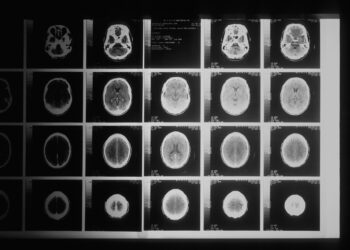Conscious breathing exercises have been shown to have a variety of benefits in terms of reducing stress and relaxing. Box Breathing can help to clear your mind, relax your body, and enhance your concentration. Deep breathing exercises can lower overall blood pressure, which can aid in improving cardiovascular health. These techniques are just a few of many techniques that can be practiced to lower the amount of stress on your body and mind and to improve mental health. [Sources: 1, 3, 9, 13]
Deep breathing helps with anxiety and post-traumatic stress disorder, and it has a lot of benefits to our mental health. Deep breathing (sometimes called diaphragmatic breathing) is a practice that allows for more air to enter the body, which may help to calm the nerves, reducing stress and anxiety. One of the biggest benefits of diaphragmatic breathing is reduced stress. Deep breathing lowers the pulse, which increases, helping us calm the body and mind. [Sources: 9, 12, 15]
The typical stress reaction can be reduced with conscious breaths using our diaphragm. The intention is to help you breathe deep from your diaphragm, eliminating shallow breaths, to reduce stress. Once you have learned to breathe deep, you may even find yourself turning to breathwork in times of increased stress. [Sources: 5, 9, 10]
Belly breaths are a base, relaxing exercise that can be useful whenever we need to unwind or de-stress. This practice helps you to recognize when you need to intentionally relax your breath to relieve stress and relieve anxiety. [Sources: 9]
Controlling breathing can help to ameliorate some of the physical symptoms of stress. When someone is relaxed, he or she is breathing slowly, evenly, and gently out their nose. When you are taking deep breaths, the air that comes through the nose is filling the lungs, the lower abdomen is rising. Your body then uses the muscles of the neck, back, and chest to help you breathe. Your abdominal muscles help to move the diaphragm, giving you more strength to push the air out of your lungs. [Sources: 2, 8, 10, 15]
COPD makes the diaphragm less efficient, so doing breathing exercises that target your diaphragm specifically may help to strengthen the diaphragm and improve breathing. If done regularly, breathing exercises can help clear your lungs of any accumulated stale air, boost your oxygen levels, and return your diaphragm to doing its job — helping you to breathe. Just as aerobic exercise can boost your heart function and strengthen your muscles, breathing exercises can make your lungs more efficient. Some studies even suggest that, besides providing immediate relief, regular breathing exercises may make people less susceptible to stress, permanently altering the circuitry of the brain. [Sources: 6, 14, 15]
Even a basic understanding of physiology helps to explain why controlled breathing induces relaxation. Abdominal breathing helps control your nervous system and encourages your body to relax, which has many health benefits. Not only does mindful breathing help to get into a more relaxed state, but it also causes the body to release endorphins, which are chemicals in your brain that make you feel good. Not only does breathing mindfully help put you in a more relaxed position, but it also causes your body to release endorphins, which are chemicals in your brain that help you feel good. When you take deep breaths, the body releases endorphins, which are the feel-good hormones, and natural painkillers produced in your own body. When we breathe deeply, diaphragm movements up and down contribute to the elimination of toxins in our bodies, promoting better blood flow. Deep breaths introduce new oxygen while letting go of toxins and carbon dioxide. [Sources: 5, 10, 11, 14]
No matter how you choose to do it, deep breathing not only keeps your whole cardiovascular system strong and healthy, it can make you feel more relaxed in all aspects. Not surprisingly, breathing deeply into your abdomen slows down your heart rate and lowers or stabilizes your blood pressure. Diaphragmatic breathing is at the core of nearly every meditation or relaxation technique, which may reduce your stress levels, decrease your blood pressure, and regulate other essential body processes. It is the focus of the meditation practice, which is known to help control symptoms for conditions as diverse as Irritable Bowel Syndrome, depression and anxiety, and sleeplessness. [Sources: 5, 8, 15]
Each technique for relaxation, or meditation relies on breathing, and this is perhaps the lowest common denominator among all approaches for calming your body and mind. Just as deep breathing helps to decrease your body’s response to pain, it helps to minimize how stress is perceived by the brain. Your breathing is not only a part of your body’s stress response but a key component. Every breath you take is a signal your body is replenishing and repairing itself. [Sources: 1, 5, 12, 14]
You breathe every single minute of every day, yet what you might not know is there are several types of breathing. If you are stressed, you might be doing that kind of breathing now (or even holding your breath subconsciously). This is the breath you take without thinking to take the breath. [Sources: 0]
Guided breathing is an amazing way to relax after a stressful or upset day. If you find yourself staying awake at night because of stressful thoughts or worries, guided breathing can help you to relax and fall more quickly into a deep sleep. [Sources: 1]
Focusing your breath helps you concentrate on taking slow, deep breaths, and helps you disconnect from distracting thoughts and sensations. Breath focus is a common characteristic in multiple techniques that induce a relaxation response. Reduces physiological symptoms of stress in the body Deep breathing techniques have been shown to dramatically decrease hormones associated with stress, such as cortisol. [Sources: 8, 13]
Researchers have even suggested relaxation response practices, such as meditation, deep breathing, and yoga may change the way your body responds to stress, changing the way some genes are switched on. More importantly, breathing exercises such as these could be used as a way of training how the body responds to stressful situations, and to decrease harmful stress hormones. Breathing exercises can help to maintain your weight, prevent wrinkles and keep your skin looking bright, decrease stress, strengthen your abdominal muscles, correct poor posture, and so on. Judi Bar uses yoga and modifications to traditional yoga breathing exercises as a way of helping patients suffering from chronic illnesses to cope with pain and illness. [Sources: 4, 7, 13]
No, we are not overstating it when we say it. Spending a few moments every day practicing some deep breathing exercises reduces stress, eases tension in the mind, and body, and may help you sleep better. Breathing properly is important to your overall well-being. Whether you are trying to lower your depression and anxiety or boost your immunity, you will be surprised by how much can be accomplished just by paying attention to your breath. Increased Mental Clarity, Energy, and Focus One study were able to demonstrate that breathing techniques could lead to better concentration and a more positive outlook. [Sources: 5, 11, 13]
Sources:
[0]: https://www.verywellmind.com/the-benefits-of-deep-breathing-5208001
[1]: https://www.makinwellness.com/deep-breathing-benefits/
[2]: https://my.clevelandclinic.org/health/articles/9445-diaphragmatic-breathing
[3]: https://www.webmd.com/balance/what-to-know-4-7-8-breathing
[4]: https://pharmeasy.in/blog/benefits-of-breathing-exercises/
[5]: https://www.claritychi.com/the-science-of-deep-breathing-and-why-its-vital-to-health/
[6]: https://www.lung.org/lung-health-diseases/wellness/breathing-exercises
[7]: https://www.npr.org/2010/12/06/131734718/just-breathe-body-has-a-built-in-stress-reliever
[9]: https://diversushealth.org/the-mental-health-benefits-of-deep-breathing/
[10]: https://www.betterhealth.vic.gov.au/health/healthyliving/breathing-to-reduce-stress
[12]: https://rightasrain.uwmedicine.org/mind/stress/why-deep-breathing-makes-you-feel-so-chill
[13]: https://www.medicalnewstoday.com/articles/321805
[14]: https://www.scientificamerican.com/article/proper-breathing-brings-better-health/
[15]: https://www.healthline.com/health/diaphragmatic-breathing










